“A disaster in the history of the Egyptian judiciary.”
“Respect for the rule of law is a main principle that must be upheld to ensure stability in the political arena and respect for the state and people”
Neither was the first sentence above uttered as a reaction to Morsi’s move last week in Egypt, nor was the second sentence voiced in support of the decisions the Brotherhood and Morsi took. These two sentences were picked among the comments on the dissolution of the elected Egyptian Parliament by the judiciary – a move that was supported by so-called liberal actors. Mohamed ElBaradei, who called Morsi the “new pharaoh,” showed his support for this dissolution with the following statement, “The verdict that confirmed the dissolution of Parliament is a first step for those in power to understand that legislation is the main pillar for building the country.”
The first sentence was articulated by the FJP legal counsel Mohamed Abu-Baraka and the second sentence was uttered by Amr Moussa, a politician left over from Mubarak era. Moussa – who has been posing to masses in city squares as of late and who watched Turkish Prime Minister Recep Tayyip Erdoğan in Davos without uttering a single word to Israeli President Shimon Peres – ElBaradei – who had not vocalized a single word to former U.S. President George Bush even though he had been serving as the director general of the IAEA at the time Bush invaded Iraq – and Hamdeen Sabahi – who applauded the dissolution of Parliament despite his “liberal stance” – all of a sudden declared Morsi the new pharaoh.
What happened in Egypt? The Egyptian regime had moved to the offensive prior to the presidential elections. The military on the one hand, the judiciary on the other did everything in their power to prevent Morsi becoming the president. They curtailed Morsi’s powers. Morsi became a newly elected president with limited powers, a Parliament or a constitutional initiative. Furthermore, he faced a collapsed economy and the bureaucratic oligarchy of the military-judiciary-intelligence alliance. In the following months, when Morsi relieved caretaker Mohamed Hussein Tantawi and acting intelligence chief Mourad Mowafy from their duties, it cleared the path for the constitutional process to commence and a new hope for potential democratization was created.
Morsi, with his newly earned momentum, intervened in the tutelary powers of the judiciary in the aftermath of Gaza. In other words, he put a halt to the de facto state of coup maintained by the judiciary. He put a halt to a coup within the bounds of etiquette and democracy to the extent that a coup can be halted in such bounds. Egypt’s liberals and remnants of its old regime that declared Morsi the “new pharaoh” because of his temporary powers should be reminded that they are able to mobilize protests, talk freely to the media and in fact attack the buildings of the incumbent party in a country supposedly “reigned by the pharaoh.” When seen from this perspective, the answer to the question whether the liberals or the “pharaoh” battling tutelage is more democratic becomes quite clear! Whether Morsi will make as powerful “a pharaoh” as claimed will be seen in the following months with the decisions and moves he makes. Nevertheless, we already saw last week that the liberals are quite adept to recreating Mubarakism!
In this article
- Foreign Policy
- Opinion
- 2012
- Egypt
- Elections
- Former U.S. President
- Global Actors | Local Actors
- Iraq
- Israel
- liberals
- Middle East
- Mohammed Morsi
- Morsi
- Morsi and Mubarakism
- mubarak
- Mursi
- President of Egypt
- Prime Minister
- Recep Tayyip Erdoğan
- SETA
- Taha Ozhan
- tahrir
- The President of the Republic of Türkiye
- Turkish President
- United States (US)
- US President


